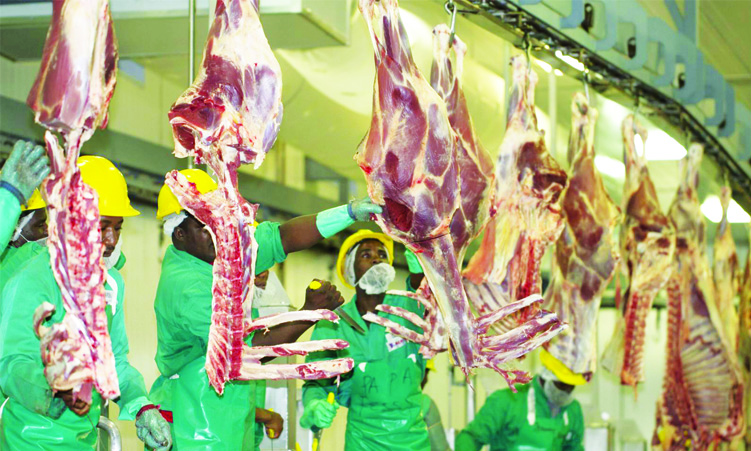About 245 commercial livestock farmers are facing viability problems following the failure of the Meat Corporation of Namibia (Meatco) to pay N$320 million for cattle delivered to its abattoir.
This is despite an agreement between Meatco and the involved farmers, stipulating payment should be made within 30 days of delivery.
Some of the farmers who spoke to The Namibian this week accused Meatco of breaching this agreement.
Meatco reportedly takes up to 90 days or more to pay farmers, leading to producers not being able to pay workers and suppliers, or covering other costs on their farms.
This was confirmed by former Livestock Producers Organisation (LPO) chairperson Thinus Pretorius, who says an estimated N$320 million (value-added tax included) was owed to producers by the end of September.
Pretorius has been dealing with the issue before the new leadership of the LPO, which is an affiliate of the Namibia Agricultural Union (NAU), took over about two weeks ago.
The NAU referred The Namibian to Pretorius.
He says the LPO has and will continue to engage all stakeholders, including the government, to find a solution.
“Meatco is slaughtering our cattle and not paying for them. We are basically facing bankruptcy, because we cannot pay our workers and we had to let some of them go,” says Rian van Wyk, who says Meatco owes him N$6 million.
“Last year they owed me N$17 million, which they paid after they were bailed out by the government with the Development Bank of Namibia (DBN) loan,” he says.
Van Wyk says about 245 individual farmers are affected by delayed payments.
Otjozondjupa cattle producer Konrad Traegersays because he was owed N$2,3 million for about 90 days. He has experienced a a lack of feed stock in the past.
He also had overheads and commitments with banks he struggled to meet.
Otavi mountain farmer Echardt Basson, who says he is owed N$1,3 million, says while he is still within the agreed 30-day payment period he anticipates a longer wait, as other farmers need to be paid first.
AUCTIONS
He says some farmers have cancelled slaughter bookings and opted to take their cattle to auctions instead, due to the delayed payments.
“Because a lot of cattle are being sent to auctions, the prices have plummeted, worsened by the fact that farmers do not have the money to buy the stock.
“I could not buy breeding bulls this year, because of cash flow problems,” Basson says.
The farmers say while they want to see Meatco’s fortunes turn, they blame the management of the parastatal for the woes the company is facing, because there is enough stock to enable Meatco to run profitably.
“This is evidenced by the fact that Meatco’s competitors are doing well,” says Van Wyk.
He says farmers are seeking an audience with minister of finance and public enterprises Iipumbu Shiimi, as well as minister of agriculture, water and land reform Calle Schlettwein.
The farmers claim Meatco’s problems stem from the wrong people being in wrong positions, which has resulted in export beef containers being sent with incomplete paperwork and being put in parking docks while awaiting the appropriate documents.
“This delays payment to Meatco, as well as to producers.
“We asked at the annual general meeting, as Meatco members and producers, for an independent consultant to evaluate the parastatal’s management, but this was shot down,” Basson says.
IMPACT OF DROUGHT
The Namibian sent questions on the allegations made by producers to Meatco chief executive Mwilima Mushokabanji on Monday and, among others, asked specifically about the alleged N$300 to N$350 million owed to farmers this year.
The company then issued a statement under Mushokabanji’s name, in which it said throughput has remained a protracted challenge over the past three years, especially after the devastating drought in 2019/20.
“Equally so, the outbreak of the novel coronavirus in 2019 negatively influenced the demand of our premium products and market realisation,” he said.
“Meatco continued to pay competitive prices significantly above the South African parity price for the bulk of Namibian slaughter-ready cattle.
“To this end, Meatco paid N$560 million (and N$492 million in 2022) to producers to protect primary livestock production.”
Mushokabanji said paying sustainable market-related prices consistently allows producers to plan their production and diversify production methods between weaner and slaughter ox production.
“Through our Norwegian quota we continued to fill our quota as per the allocated tonnages,” he said.
As a result, Meatco sold 590 tonnes more beef and increased its revenue by N$113 million compared to the prior year.
For the period under review, Meatco injected a total value of N$1 billion to various stakeholders, Mushokabanji said.
“For many years, farmers from the northern communal areas (NCAs) were deprived of accessing current niche markets, and the opportunities are now available to access such markets due to our robust market development strategy that we implemented,” he said.
Mushokabanji said Meatco has successfully mainstreamed the NCAs into the Namibian economy by operating the Katima Mulilo abattoir and marketing certified beef.
A forensic report by Ombu Capital, a firm owned by former Standard Bank Namibia chief executive Vetumbuavi Mungunda and presented at this year’s annual general meeting, documented a seven-month analysis and sector-wide consultation.
The report recommended a viable business model for Meatco’s long-term sustainability.
“Meatco is currently incurring losses exceeding N$20 million per month, which must be stemmed before they place Meatco’s operational existence and the livestock sector at risk – a sector which sustains over 60% of Namibia’s livelihoods,” Mungunda said in the report.
At the time of its compilation, Meatco’s liabilities were said to exceed its assets by N$133,2 million.
ECONOMIST’S VIEW
Reacting to Meatco’s statement, local economist and farming consultant Rainer Ritter wrote to Mushokabanji on Tuesday:
“Meatco provides two reasons for the non-payment or late payment, namely the high volumes due to the drought and changes in critical logistical documentation and procedures . . .
“It is stated that Meatco slaughtered 53 820 head of cattle this year already, and they say due to the high volume they cannot pay on time.
“During the 2019 drought Meatco slaughtered 116 304 cattle and they paid on time, thus the high-volume argument is a flimsy excuse.”
Regarding changes in logistical documentation and procedures, Ritter said: “Beefcor at Okahandja is also exporting beef to Norway and the European Union, and they have not experienced delays . . . “
He said Meatco has been exporting beef to Europe since the nineties, and more than 30 years of experience with logistical documentation and procedures cannot be an excuse any more.
“The second excuse of Meatco is thus only a manifestation of mismanagement or is a false excuse,” Ritter wrote.
Asked for comment, agriculture ministry spokesperson Jona Musheko referred questions to the finance ministry.
Finance ministry spokesperson Wilson Shikoto said the ministry would issue a statement on the matter soon.
– email: matthew@namibisan.com.na
Stay informed with The Namibian – your source for credible journalism. Get in-depth reporting and opinions for
only N$85 a month. Invest in journalism, invest in democracy –
Subscribe Now!






